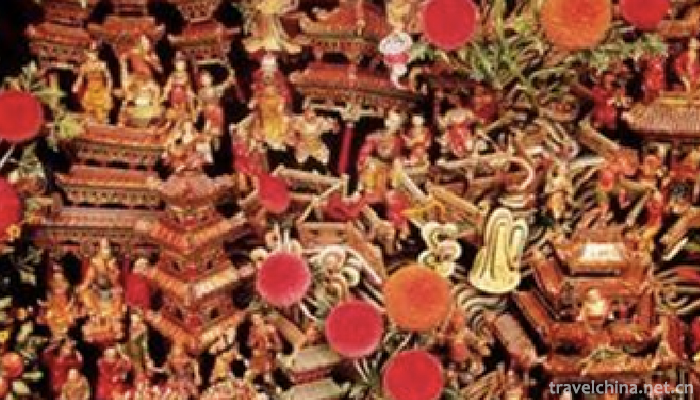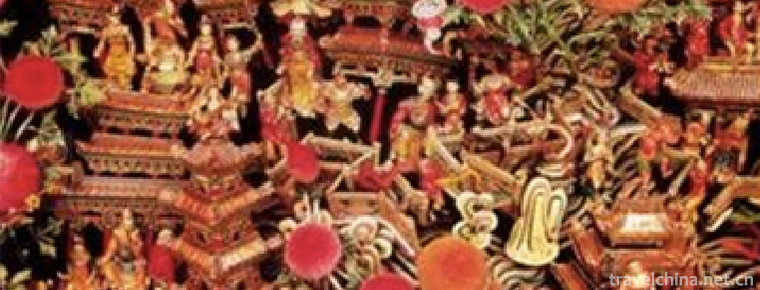Sweat green
Sweat green
"Khan Qing Gele" is a heroic epic of the Mongolian people in Haixi. In the form of rap and speech, it tells the story of the Mongolian heroes destroying demons and saving the people, flashing the wisdom of the Mongolian people in pursuit of a better life.
In June 2008, the "Khan Qing Gele" declared by Haixi Mongolian and Tibetan Autonomous Prefecture of Qinghai Province was listed in the second batch of national intangible cultural heritage list with the approval of the State Council.
Heritage serial number: 557 I-70.
historical origin
The Hercynian heroic epic Khan Qing Gele in Haixi, Qinghai Province, has the special local characteristics of Haixi. It is a folk artist of the Hercynian Mongolian nationality who, in the form of rap or speech, vividly reflects the history and social life and production of the Mongolian nationality in plain language. In the heroic epic, the intense war between heroes is mainly aimed at expanding the grazing land with abundant water and grass, plundering population, beauty, horses, livestock and property, or revenging blood and kin. It shows people's desire to conquer nature, pursue happiness, and abhor the dark forces of the old times. It flourished at the end of primitive society and at the beginning of slavery.
primary coverage
Qinghai Mongolian heroic song and dance epic "Khan Qing Gele" governs the Northwest Plateau of Bayin Hudel Alaten Khan's Prince Khan Qing Gele to marry far away. On the way, they met the hunter Made Wulan, and they went together. The two passed through three difficulties and went to the girl's home. But at the same time, the God Kuleghu and Battle came to marry. The two sides could not argue. The girl's father (Bali Magzhil Khan) proposed to use wrestling, archery and horse racing to decide who would marry the girl who took him. After a fierce competition, Khan Qing-gler defeated God's Kuleghu and Bartel and married Naren Zandan as his wife. When he returned to his Khanate, Pythagus robbed Khanqingler's father and his family's property, leaving his home in ruins. Khan Qinggler went to Pythagus for revenge. Khan Qinggler overcomes many hardships on his way to find Pythagus. Eventually, he kills the vicious Pythagus, defends his hometown, rescues his relatives, returns to the capital of the Khanate Kingdom to hold a grand wedding and live a happy life. The epic embodies the noble moral character of Khan Qing-gler, who loves his hometown, motherland and people, advocates the spirit of heroism and advocates people's pursuit of a peaceful, free and equal life.
A variant of Khan Qing Ge Le, which is popular among the Mongolian people in Qinghai and Subei counties, also describes that with the help of the Jieyi brothers, the hero Khan Qing Ge Le, through his father-in-law's three competitions of horse racing, archery and wrestling with heroes, has countless Mongolian epic poems that test the marriage type of the wife and hero by marrying the Zandan girl.
The epic "Khan Qing Gele" recorded by Schinbachtu in 2006 is transcribed as it is, without modification. In addition, the epic "Hudel Altaihan" sung by Robson in Slavic by Tubai and Cao Lumeng of the Language Investigation Group in 1957 in Subei County, Gansu Province, was also published here according to the records.
Inheritance significance
This heroic epic is rare in Mongolian folk literature and has important historical research value. The Hercynian heroic epic Khan Qing Gele is a wonderful flower in the Mongolian cultural treasure house, which contains the wisdom and wisdom of the Mongolian people, and is praised by scholars both inside and outside the province as one of the three peaks of Mongolian folk literature in Qinghai.
Inheritance and protection
Among the second batch of national intangible cultural heritage lists and the first batch of expanded intangible cultural heritage lists published by the State Council, Haixi Mongolian Tibetan Autonomous Prefecture of Qinghai Province has two intangible cultural heritage lists. Among them, the Hercynian heroic epic "Khan Qing Gele" was listed in the second batch of national intangible cultural heritage list.
Influenced by Qinghai's natural environment, in the process of inheritance, there are variations, with strong regional characteristics of the West. Hercynian Mongolians call "heroic epic" as "Tuji", and their rappers as "Tujiqi". The number of Tujiqi in the world is very small, and they are old enough to face the crisis of inheritance and need to be rescued and protected urgently.


-
2.Huaqing Pool Scenic Area
Tang Huaqing Palace is another palace for feudal emperors in Tang Dynasty. Later also known as "Huaqing Pool", located in Lintong District, Xi'an City, Shaanxi Province.
Time 2018-12-12 -
3.Yunnan Wildlife Park
Yunnan Wildlife Park is located in Qingshuihe Village, Fengyuan Road, Panlong District, Kunming City (beside Yunnan Forestry Department), 10 kilometers from the urban center of Kunming City
Time 2018-12-22 -
4.Hengdian Film and Television City Scenic Area
Hengdian Film and Television City is a large-scale comprehensive tourist area which integrates film and television, tourism, vacation, leisure and sightseeing. It has been rated as the national AAAAA-
Time 2019-01-13 -
5.Taishan Hot Spring City
Taishan Hot Spring City Cultural Tourism Scenic Spot is invested and constructed by Shandong Taishan Hot Spring Tourism Development Co., Ltd. with a total investment of 2.6 billion yuan
Time 2019-02-13 -
6.Wuzhizhou Island Scenic Area
Wuzhizhou Island is situated in Haitangwan Bay in the north of Sanya City. It is opposite to Monkey Island in the South and is adjacent to Yalong Bay
Time 2019-02-24 -
7.Legend of Chen Sanwuniang
Li Jing Ji of Chen Sanwuniang is an ancient folklore, belonging to the legendary works of Ming Dynasty in China. The author has lost his life in Quanzhou (Chen Sang) of Fujian Province
Time 2019-04-16 -
8.Traditional archery
The traditional bow is an ancient invention consisting of three parts: wood, horn and tendon. The manufacturing process is complex and the materials used are various, and the workmanship and material
Time 2019-04-19 -
9.Qin opera
Qin Opera, also known as Bangzi Opera, is a traditional drama in Northwest China and one of the national intangible cultural heritage.
Time 2019-06-10 -
10.Cao Hong
Cao Hong(? - two hundred and thirty two). Pei Guo Qiao (now Anhui) Bozhou People. Emperor Wei and Emperor Wei of the late Han Dynasty and the Three Kingdoms period Cao Cao From brother.
Time 2019-09-15 -
11.North China Electric Power University
North China Electric Power University is a national key university directly under the Ministry of Education. It is a key construction University of "211 Project" and "985 Project Advant
Time 2019-09-22 -
12.Location of Meishan
Meishan is located in the southwest of Chengdu Plain and the middle reaches of Minjiang River in Sichuan Basin. It spans 29 ° 24 ′ - 30 ° 16 ′ N and 102 ° 49 ′ - 104 ° 30 ′ e. it is 150 km long from east to west and 72 km wide from south to north. It connects Chengdu,
Time 2020-12-18